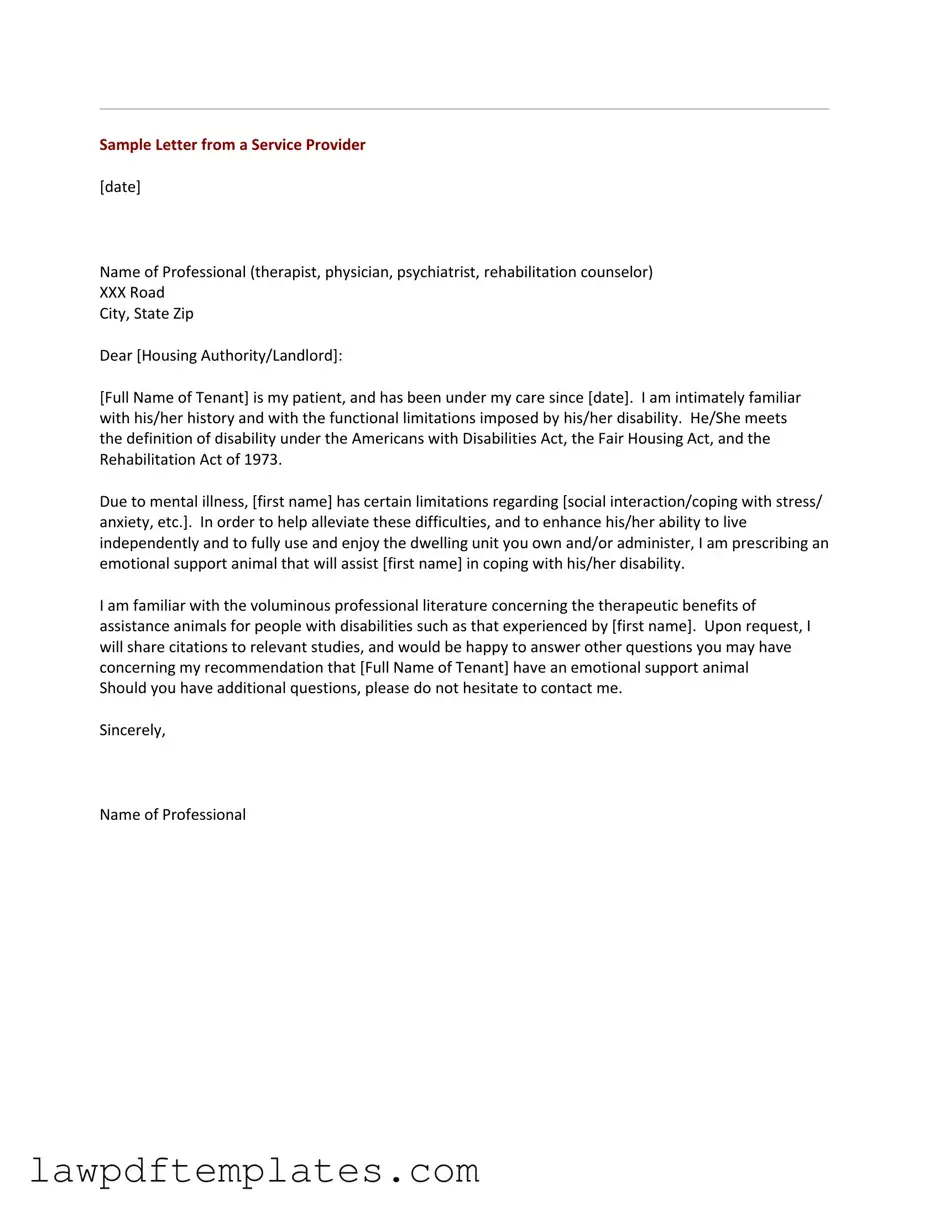Fillable Emotional Support Animal Letter Template
File Details
| Fact Name | Details |
|---|---|
| Definition | An Emotional Support Animal (ESA) letter is a document from a licensed mental health professional that verifies an individual's need for an emotional support animal. |
| Legal Basis | Under the Fair Housing Act, individuals with disabilities may request reasonable accommodations for their emotional support animals in housing. |
| State-Specific Laws | Some states have additional laws governing emotional support animals, such as California's Civil Code Section 54.2, which outlines the rights of individuals with ESAs. |
| Validity Period | ESA letters typically do not expire, but some landlords or airlines may request updated letters annually. |
| Requirements | The letter must include the mental health professional's license number, signature, and contact information, confirming the individual's need for an ESA. |
Sample - Emotional Support Animal Letter Form

Sample Letter from a Service Provider
[date]
Name of Professional (therapist, physician, psychiatrist, rehabilitation counselor)
XXXRoad
City, State Zip
Dear [Housing Authority/Landlord]:
[Full Name of Tenant] is my patient, and has been under my care since [date]. I am intimately familiar with his/her history and with the functional limitations imposed by his/her disability. He/She meets the definition of disability under the Americans with Disabilities Act, the Fair Housing Act, and the Rehabilitation Act of 1973.
Due to mental illness, [first name] has certain limitations regarding [social interaction/coping with stress/ anxiety, etc.]. In order to help alleviate these difficulties, and to enhance his/her ability to live independently and to fully use and enjoy the dwelling unit you own and/or administer, I am prescribing an emotional support animal that will assist [first name] in coping with his/her disability.
I am familiar with the voluminous professional literature concerning the therapeutic benefits of assistance animals for people with disabilities such as that experienced by [first name]. Upon request, I will share citations to relevant studies, and would be happy to answer other questions you may have concerning my recommendation that [Full Name of Tenant] have an emotional support animal Should you have additional questions, please do not hesitate to contact me.
Sincerely,
Name of Professional
Common mistakes
Filling out an Emotional Support Animal (ESA) Letter form can be a straightforward process, but many people make common mistakes that can lead to delays or complications. One frequent error is failing to provide complete information. Each section of the form requires specific details about the individual and their needs. Incomplete forms may be rejected or returned for additional information, causing unnecessary stress.
Another mistake is using vague language. Describing the need for an emotional support animal should be clear and specific. Instead of saying, "I need my dog," it is better to explain how the animal helps with emotional well-being. This clarity can make a significant difference in the approval process.
Some individuals neglect to include proper documentation. An ESA letter must be signed by a licensed mental health professional. Without this signature, the letter holds no weight. Always ensure that the professional’s credentials are included and up to date.
People sometimes overlook the importance of the date on the letter. An ESA letter should be current. If the letter is dated too far in the past, it may not be accepted by housing providers or airlines. Keeping the letter fresh can prevent issues down the line.
Another common error is failing to understand the specific requirements of the housing provider or airline. Different organizations may have unique criteria for ESA letters. Always check their guidelines to ensure compliance. Submitting a form that does not meet these criteria can lead to rejection.
Some individuals make the mistake of not being honest about their situation. Misrepresenting the need for an emotional support animal can have serious consequences. It is crucial to be truthful about the emotional challenges faced and how the animal assists in coping.
Additionally, people may forget to proofread the form. Typos or grammatical errors can detract from the professionalism of the letter. A well-written letter conveys seriousness and attention to detail, which can positively influence the reader's perception.
Another mistake is waiting until the last minute to submit the form. Procrastination can lead to rushed applications and increased chances of errors. It is wise to allow ample time for review and potential revisions before submission.
Some individuals also fail to keep copies of their submitted forms. Having a record of what was sent can be invaluable if questions arise later. This oversight can complicate communication with housing providers or airlines.
Finally, many people do not follow up after submitting the form. Checking in can provide peace of mind and ensure that the application is being processed. A simple follow-up can clarify any issues that may have arisen during the review process.
Common PDF Documents
Lease Agreement for Trucking Company - Failure to comply with the agreement may result in termination of the contract by the Carrier.
To simplify the process of package delivery, using the FedEx Release Form is highly recommended, as it allows for convenient delivery options when you're not home. To assist with the completion of this essential document, you can find valuable resources at Fast PDF Templates, which provide guidance on filling out the form correctly to prevent any potential delivery issues.
Pharmacy Medication Labels - Note any non-prescription medications being taken.
